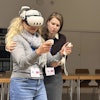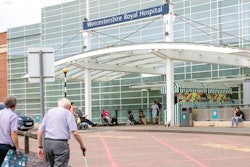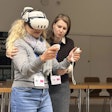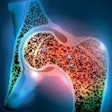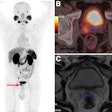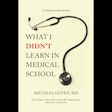
Widespread shortages of pediatric radiologists are causing child abuse to be misdiagnosed and bone fractures to be reported incorrectly in babies, according to an in-depth report posted on 27 June by a leading U.K. national newspaper.
The shortages, which are particularly acute in the U.K.'s smaller district (regional) hospitals, and the resulting lack of expertise also mean that hard-to-spot injuries are being missed, leaving other babies at risk, the Sunday Times stated.
The report was "fairly accurate," Dr. Owen Arthurs, a consultant pediatric radiologist at London's Great Ormond Street (GOS) Hospital and associate professor of radiology at the University College London GOS Institute of Child Health, told AuntMinnieEurope.com on 28 June.
 Dr. Owen Arthurs. Photo courtesy of Great Ormond Street Hospital
Dr. Owen Arthurs. Photo courtesy of Great Ormond Street Hospital"There are two issues really -- one is the availability of pediatric radiologists to report on everyday clinical work due to a national shortage, etc.," he said. "And the other is a shortage of those willing to come forward to give expert testimony to the courts."
Most centers do not have access to a specialist pediatric radiologist 24/7, and some centers do not have access at all, Arthurs told the Sunday Times. "It's not that they're not doing their best, they're doing their best under very limited circumstances."
He said that National Health Service (NHS) hospital trusts (or groups) were often reluctant to put forward their experts to double-check diagnoses from smaller hospitals because they were likely to get tied up in court cases and a "perception that doing these kinds of cases is associated with negative media coverage."
Rib fractures missed
In the Sunday Times article, Dr. Kath Halliday, a consultant pediatric radiologist at Nottingham University Hospitals, described a case in which rib fractures were not spotted on a chest x-ray of a baby who was being investigated for a cough.
"The pediatrician was quite inexperienced and didn't see them. He was looking for signs of infection and wasn't really looking for rib fractures. The baby went home and that night that baby was beaten up to such an extent that they will never be the same again," she said.
Halliday said in the "vast majority" of cases, the diagnosis is agreed by two experienced clinicians, in line with guidelines from the U.K. Royal College of Radiologists, but sometimes that did not happen.
 Dr. Kath Halliday.
Dr. Kath Halliday."It's probably easiest to overdiagnose [abusive injuries] because the consequences of underdiagnosing are so bad. The consequences of overdiagnosing are also bad, but they're not quite as obvious as a dead baby that comes in after you just sent them home," she noted.
The shortage of radiologists is particularly bad in pediatrics, with 55% of vacancies in England being unfilled in 2020.
"There's this real pressure to make decisions very quickly. It's a real worry that some children are taken away from their families that shouldn't be," Dr. Adam Oates, a consultant pediatric radiologist at Birmingham Children's Hospital, told the Sunday Times.
Some parts of the U.K. have very few specialists. North East England has just five consultant pediatric radiologists -- nine times fewer per capita than in London, where there are 70. The area also has one of the highest rates for investigating young babies for physical abuse, with one in 83 assessed last year, the article stated.
According to the Sunday Times, "In one case in the region, radiologists diagnosed small bleeds on the brain that were interpreted as possibly indicating abuse in a week-old baby. They were discovered in an MRI scan after the baby had a child protection medical because of an unexplained bruise. The baby had had a difficult vaginal birth and, after months of separation from its parents, a court-appointed expert in brain imaging said the suspected bleeds were probably normal marks from birth."
Real difficulties at smaller hospitals
Oates said problems typically arose at smaller hospitals. "If you go to a small district general hospital, the radiologists there will not have the same level of experience ... detecting fractures in children is not the same as in adults because the immature bones are different and therefore things that look like fractures may not be fractures."
He thought there was "a tendency to overcall" rib fractures in particular because they are "very subtle" and can indicate the shaking of a baby. Inexperience increases a tendency to dismiss explanations for fractures, he added.
"I have known a situation when the parents' story seemed very unlikely and abuse was suspected, but CCTV was subsequently found which showed a very plausible accidental cause of an injury," he told the Sunday Times, adding that he hoped that by recruiting more consultants to take on expert court work, the delays to getting a mistaken diagnosis overturned would be reduced.
The British Association of Social Workers said it was "concerned about the shortage of radiologists as social workers don't work in silos, they work in multidisciplinary teams and experienced radiologists are vital in diagnosing skeletal surveys to establish whether a child has been deliberately abused or not."
The U.K. Department of Health and Social Care said it had begun to address the shortage. "The number of doctors working in clinical radiology has risen by over 25 percent in the past five years," the organization told the newspaper.



